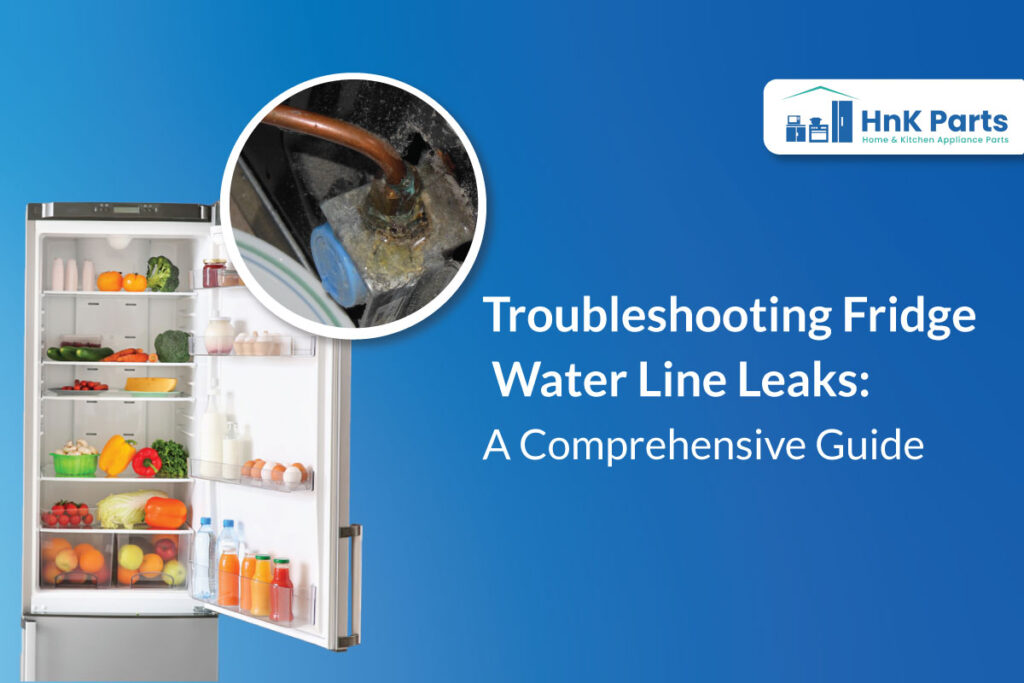Modern refrigerators often come equipped with a convenient water dispenser feature, making it easy to access chilled water. However, a persistent issue faced by many homeowners is the occurrence of leaks in the fridge’s water line. These leaks not only cause inconvenience but also pose a risk of water damage and the development of mold.
In this detailed guide, we’ll take you through a step-by-step troubleshooting process, helping you identify the reasons behind fridge water line leaks and providing practical solutions to address them.

Common causes of fridge water line leaks
Fridge water line leaks can be a frustrating issue, often causing water damage and potential appliance malfunctions. Grasping the typical reasons for these leaks is essential to conduct troubleshooting with effectiveness.
Faulty Water Supply Line Connections:
Examine the junctions linking the refrigerator and the water supply line, searching for any indications of looseness or impairment. Tighten connections and inspect for any visible wear or tear.
Damaged Water Filter:
A compromised Refrigerator water filter can lead to leaks. Ensure the filter is securely installed and free from cracks. Regularly change it in accordance with the guidelines provided by the manufacturer.
Clogged or Frozen Water Lines:
Blockages or the development of ice in the water lines can impede the seamless water flow, potentially resulting in leaks. Restore optimal water circulation by thawing frozen lines and eliminating any blockages that may impede the flow.
Faulty Water Inlet Valve:
Inspect the inlet valve thoroughly to identify any indications of wear or malfunction, allowing you to pinpoint potential issues with precision. A malfunctioning Water Inlet Valve has the potential to cause water leaks, posing a threat to the integrity of your system Replace it if necessary, following the appliance’s maintenance guidelines.
Aging or Damaged Tubing:
Inspect the tubing connecting the water supply to the fridge. Over the course of time, tubing may undergo deterioration, resulting in the development of leaks. Swiftly exchange any deteriorated tubing to forestall the emergence of additional complications.
Step-by-Step troubleshooting steps
our step-by-step troubleshooting guide is here to help. Follow these easy steps to identify and resolve the problem, ensuring your fridge stays dry and your kitchen remains spotless.
Identify the Source:
Start by locating the leak. Examine the water line situated behind your refrigerator, carefully checking for any apparent cracks or loose connections. Ensure the water pipeline is in prime condition to avert leaks and uphold seamless functionality, promoting optimal efficiency.
Turn Off the Water Supply:
To guarantee the security of your refrigerator, it’s essential to disable the water supply. This is commonly done by turning the shut-off valve clockwise. Safeguarding your appliance and preventing potential water-related issues is a crucial step in maintaining its optimal functioning.
Inspect Water Line Connections:
Inspect the water line connections for any indications of wear or damage. Make sure to tighten all loose fittings and replace any faulty components with brand-new ones to ensure optimal security and functionality. Prioritize regular checks to maintain the integrity of the water line system, promoting longevity and optimal performance.
Check the Water Filter:
A blocked or wrongly installed water filter may cause leaks. Proper maintenance and installation are essential to prevent potential issues, ensuring a secure and efficient filtration system for your home or business. Ensure the filter is securely in place and replace it if necessary.
Preventive measures and maintenance tips
This comprehensive guide outlines preventive measures and maintenance tips to help you troubleshoot fridge water line leaks effectively.
Preventive Measures:
Regular Inspection:
Perform routine visual examinations of your refrigerator’s water line to identify any indications of wear, bends, or impairment. Early detection is key to preventing leaks before they escalate. Timely identification helps address and avert potential problems proactively.
Proper Installation:
Ensure that your fridge water line is correctly installed, without any kinks or bends that could lead to stress on the line. Follow the manufacturer’s guidelines during installation to avoid potential issues.
Use High-Quality Materials:
Invest in top-quality water lines and connectors for lasting performance and reliability in your system. Cheap or worn-out materials are more prone to leaks, so choose durable options to ensure the longevity of your fridge water line.
Maintenance Tips:
Replace Water Lines Regularly:
Over time, water lines can degrade, leading to leaks. Ensure peak performance by updating your water line every five years or following the manufacturer’s suggested timeline. This proactive approach guarantees optimal functionality and longevity, supporting your system for years to come.
Check for Loose Connections:
Regularly check and tighten water line connections to prevent leaks and ensure consistent performance. Loose fittings can result in water leaks, and a simple adjustment can prevent a potential disaster.
Monitor Water Pressure:
Excessive water pressure poses a potential threat to water lines, elevating the likelihood of leaks. Employ a water pressure gauge to verify that the pressure aligns with the recommended range. Should it exceed the permissible limits, contemplate the installation of a pressure regulator to mitigate potential damage.
Clean the Water Filter
A blocked water filter can raise pressure and cause leaks. Promptly addressing clogs is essential to prevent potential damage. Follow the manufacturer’s advice for timely water filter cleaning or replacement to maintain optimal water flow.
Inspect the Ice Maker:
Regularly examining your refrigerator’s ice maker is crucial to detect any potential leaks or malfunctions. Vigilantly monitor it to guarantee peak performance and proactively avert any potential challenges. Faulty ice makers can contribute to water line leaks, so address any issues promptly.
Troubleshooting fridge water line leaks requires a systematic approach. Regular maintenance, timely filter replacements, and vigilant inspection of components are crucial for preventing leaks and ensuring the longevity of your refrigerator. Adhering to the insights provided in this all-encompassing guide not only allows you to conserve time and money but also spares you the inconvenience of managing potential water-related issues in your kitchen. Keep your fridge water line in optimal condition, and enjoy the convenience of a reliable water dispenser for years to come.
FAQS
1. Why is my refrigerator water dispenser leaking?
A: Fridge water line leaks can be attributed to various factors, including a faulty water supply line, a damaged water filter, or issues with the water inlet valve. Continuous usage and aging of these elements may result in observable leaks.
2. How can I troubleshoot and fix a leaking water line in my refrigerator?
A: The troubleshooting process involves several steps, such as turning off the water supply, inspecting the water supply line for damage, checking and replacing the water filter, examining the water inlet valve, and ensuring all connection points are secure. Following this step-by-step guide can help identify and address the root cause of the leak.
- Troubleshooting Fridge Water Line Leaks: A Comprehensive Guide - November 25, 2023








